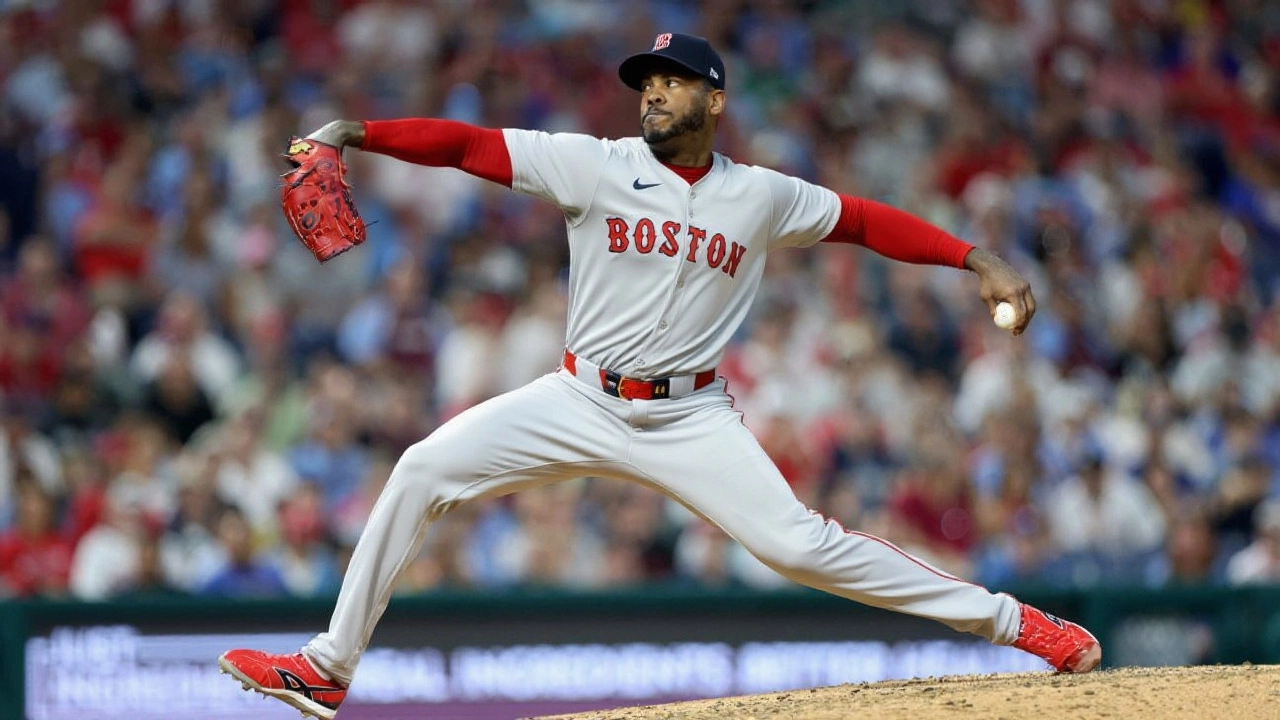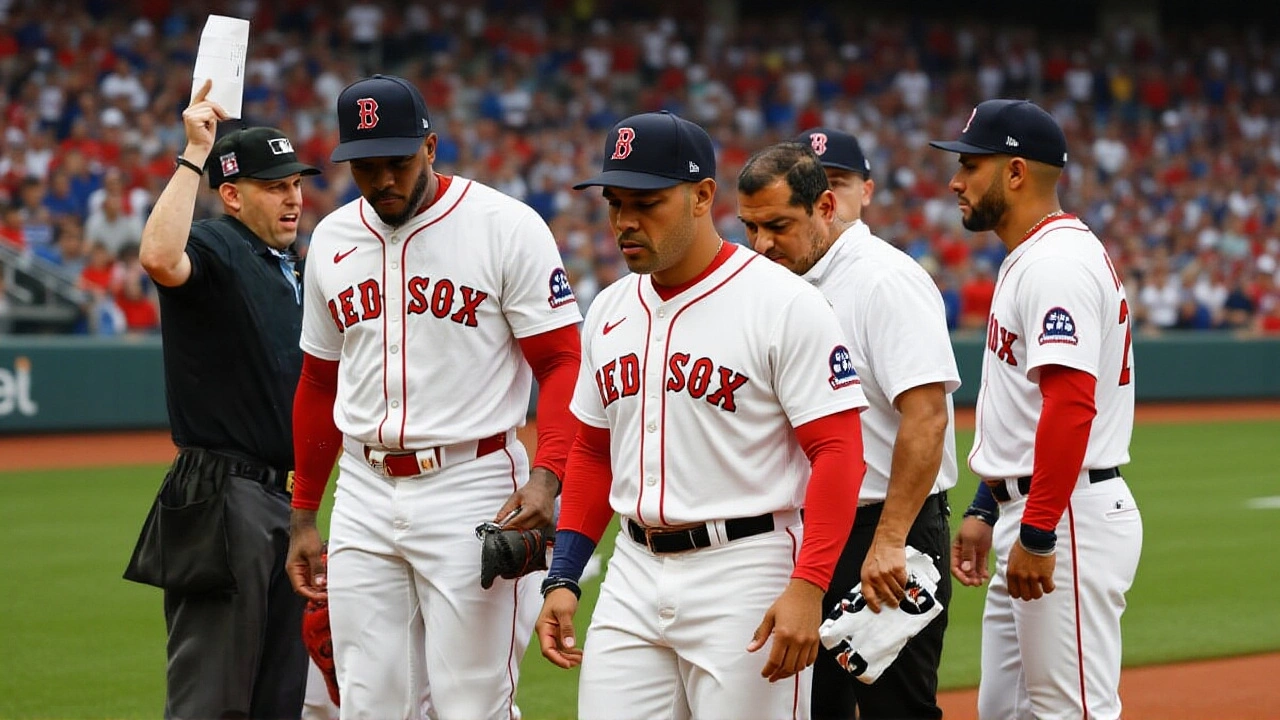
When Aroldis Chapman signed a one‑year, $13.3 million contract extension, the Boston Red Sox effectively locked in their premier closer through the 2026 season, with a vesting option that could push his earnings to $26 million if certain innings thresholds are hit. The deal, first reported by Beisbol FR on June 30, 2025, includes a $1 million signing bonus, $12 million guaranteed for 2026 and a $13 million option for 2027 that triggers only if Chapman logs at least 40 innings next year. It’s a move that silences any free‑agency speculation and gives Boston a rare piece of stability at the back end of the bullpen.
Why the Deal Matters for Boston
Boston’s front office has been in a whirlwind since the mid‑season trade of Rafael Devers to the New York Yankees in June 2025. That trade left a void not just in the lineup but also in clubhouse chemistry. Securing Chapman, who emerged as the team’s reliable fireballer after a rocky finish with the Yankees, plugs a hole that could have forced the Red Sox into a costly free‑agency scramble.
Chief Baseball Officer Craig Breslow told the Boston Globe, “When you have a closer posting historically good numbers in the middle of a season, it becomes a conversation you can’t ignore. Aroldis wants to stay, we want to stay together.” The sentiment echoes manager Alex Cora, who praised the veteran’s “unique chemistry” with the pitching staff and the medical team.
Chapman's 2025 Dominance
Statistically, Chapman’s 2025 campaign reads like a textbook case of late‑career resurgence. Across 53‑58 appearances he logged a microscopic 1.00‑1.02 ERA, recorded 26‑28 saves out of 28‑30 opportunities, and struck out 74‑77 batters in just 52‑54 innings. His walk rate sat at a career‑low 7.3 %, and opponents managed a paltry .119 batting average against him.
He’s still throwing heat, regularly touching 100 mph and even touching a season‑high 103.1 mph on a fastball that seemed to defy his 37‑year‑old frame. The shift in his repertoire—adding sinkers, sliders, and splitters—has kept hitters guessing, a fact reinforced by advanced Statcast metrics. According to Statcast, his expected ERA sits at 1.97 and his expected batting average against is .167, numbers that suggest his dominance isn’t a fluke of small‑sample luck.
Negotiations and Team Chemistry
When Chapman first arrived in Boston in December 2024, he signed a modest one‑year deal after three consecutive seasons with an ERA north of 3.00. Yet the 2025 run convinced both sides to reevaluate. In a candid media interview, Chapman explained, “Of course I thought about free agency and the money, but the chemistry here is unique. The coaching staff, medical staff, and the guys in the clubhouse make staying easy.”
The competition for the closer role during spring training—against Liam Hendriks, Justin Slaten and Garrett Whitlock—ended with Chapman emerging as the clear choice, a decision reinforced by his All‑Star selection—his eighth—in 2025.

Implications for the Red Sox Offseason
Locking Chapman in gives Boston breathing room when it comes to allocating payroll. The team can now focus on bolstering the rotation and addressing the outfield void left by Devers. Analysts note that the $13.3 million extension is a bargain when measured against the market rate for elite closers, who often command $15‑$18 million for a single year.
Should the vesting option for 2027 kick in, the Red Sox would be on the hook for $26 million over two years—still a reasonable deal if Chapman can replicate his sub‑2.00 ERA. The clause also incentivizes him to stay healthy and pitch at least 40 innings in 2026, a target he’s likely to meet given his current workload.
Historical Perspective on Chapman’s Career
Chapman’s 361 career saves rank 13th all‑time, placing him among legends like Trevor Hoffman and Mariano Rivera. He’s a two‑time World Series champion, having won with the Houston Astros (2017) and the Boston Red Sox (2021). After a turbulent finish with the New York Yankees—where a public feud with the coaching staff seemed to spell the end of his effectiveness—Boston offered a fresh start that reignited his career.
His evolution from a pure fastball‑slider pitcher to a more diversified arsenal mirrors the broader trend of veteran relievers extending longevity by adding complementary pitches. The Boston crowd, still buzzing from the 2021 championship, now enjoys watching a veteran who still whips pitches past 100 mph on a regular basis.
Key Contract Terms at a Glance
- $1 million signing bonus.
- $12 million guaranteed salary for the 2026 season.
- $13 million vesting option for 2027, contingent on 40+ innings pitched in 2026.
- Total possible earnings over 2025‑2027: $26 million.
- Option triggers a total of $26 million, effectively $13 million per year if exercised.

Frequently Asked Questions
How does Chapman’s extension affect the Red Sox bullpen strategy?
With Chapman locked in, Boston can shift its focus to reinforcing the middle relievers and the back‑end of the rotation. The front office can now allocate money to acquire a high‑leverage setup man without worrying about a late‑season closer void.
What were the main reasons Chapman chose to stay in Boston?
Chapman cited team chemistry, the quality of the coaching and medical staff, and a sense of belonging in the clubhouse. He also mentioned the city’s fanbase and the competitive outlook as key factors in his decision.
What is the vesting option and how likely is it to be triggered?
The vesting option guarantees a $13 million salary for 2027 if Chapman throws at least 40 innings in 2026. Given his current workload and durability, analysts rate the likelihood at around 75 %.
How does Chapman’s 2025 performance compare to his career averages?
His 2025 ERA of roughly 1.00 is dramatically lower than his career 2.70 ERA, and his strikeout‑per‑nine‑innings rate (12.5) tops his career rate of 10.5. The season marks a statistical peak for the veteran.
What impact does this have on the Red Sox’s free‑agency plans?
By securing Chapman, Boston removes a major free‑agency target from its list, allowing the front office to concentrate on acquiring a starting pitcher, a middle infielder, and an outfield bat to replace Devers.